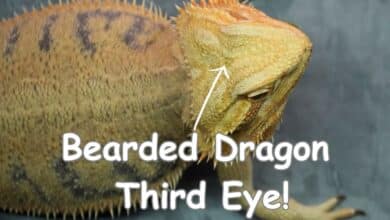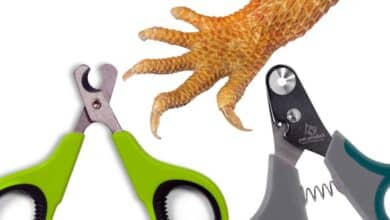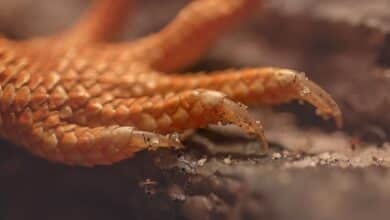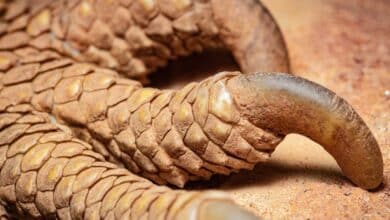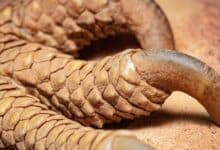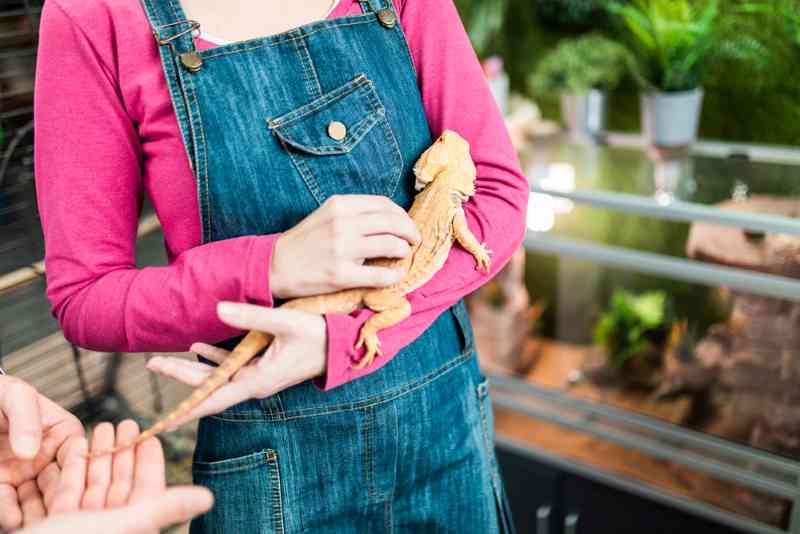Bearded Dragon Impaction & Natural Laxatives (Home Care)
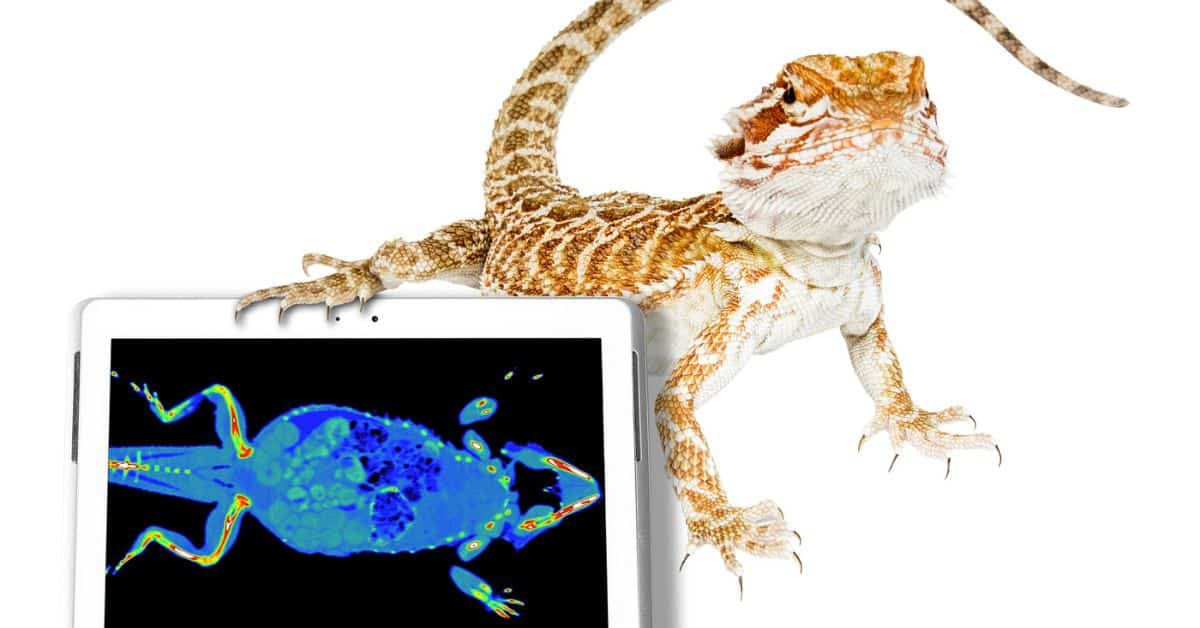
Bearded dragons, like humans, can become backed up and unable to pass a necessary bowel movement. In this guide, we’ll detail what is an impaction, how they are caused, how to treat impactions in bearded dragons with home remedies, and things you can do to help prevent them in the future.
Contents
What Bearded Dragon Impactions
What Is An Impaction?
When a bearded dragon’s digestive tract is clogged, impaction occurs. Consumed substrate and undigested meals are the common causes of this health ailment. Mobility difficulties, weight loss, and bulging along their spine are all symptoms.
When an impaction grows large enough, it can pressure the exposed nerves. As a result, they lose part or all control of their back legs. So, if you ever notice that your bearded dragon is having difficulty walking, shaking, or has trembling or non-mobile hind legs, or other similar signs, consult your local reptile vet immediately.
What to Do If You Suspect Your Bearded Dragon Has an Impaction?
If you think your bearded dragon has an impaction, one of the first things you can try to do is massage them gently down toward its vent. Sometimes this can help your bearded dragon pass an impaction by pushing it down through its digestive tract.
However, it is also strongly advised to immediately take your pet to a veterinarian specializing in exotic animal treatment. After all, since impaction can be fatal, a veterinarian should always treat any suspected impaction immediately.
The Most Common Causes of Impaction
Several factors can contribute to the development of impactions in bearded dragons, including:
- Improper Diet: Bearded dragons require a balanced diet that includes a variety of vegetables, fruits, and insects. Feeding a diet that is too high in protein or too low in fiber can contribute to impactions.
- Substrate Ingestion: The substrate in a bearded dragon’s enclosure can also contribute to impactions. Loose particle substrates, such as sand, pellets, or gravel, can be particularly problematic.
- Inadequate Water Intake: Bearded dragons always require fresh, clean water. Dehydration can contribute to the development of impactions.
- Size of Prey: Bearded dragons should only get appropriately sized prey items no larger than the space between their eyes. Feeding prey items too large can lead to impactions, including crickets, feeder mice, roaches, and other larger live prey.
- Lack of Exercise: Bearded dragons require exercise to help promote healthy digestion and bowel movements. Lack of exercise can contribute to the development of impactions.
It is important to provide your bearded dragon with a healthy, balanced diet, appropriate substrate in their habitat, plenty of fresh water, and regular exercise to help prevent the development of impactions.
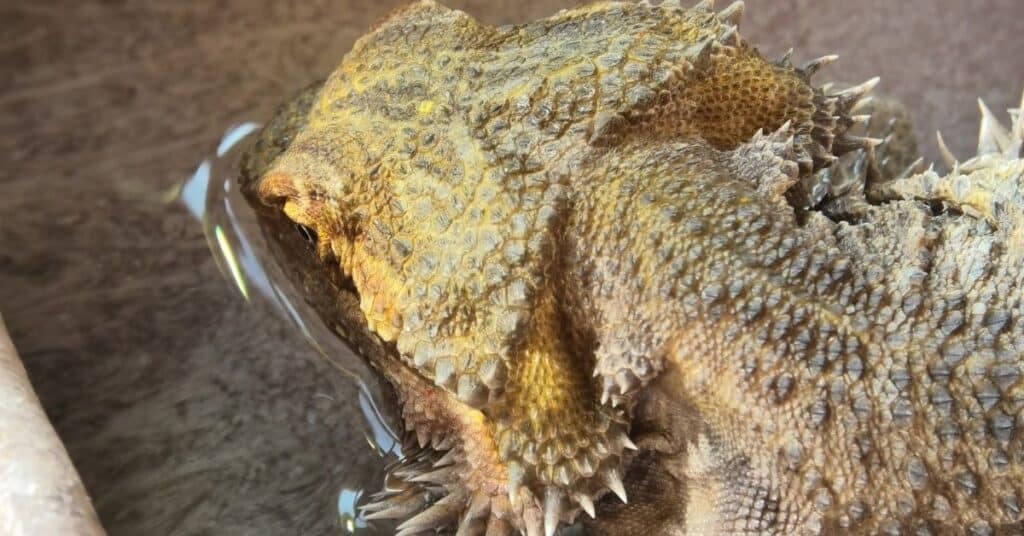
How Do You Know If Your Bearded Dragon Is Impacted?
Below are the common signs and symptoms that may suggest your beardie has an impaction. These symptoms of impaction in a bearded dragon are in order from early signs to advanced stages of prolonged impaction.
Loss of appetite
An early sign of impaction is a lack of appetite. However, it will be slow and subtle changes in their eating habits, making it hard to notice. As the impaction progresses for a longer period, the bearded dragon may have a drastically reduced eating or may not eat at all.
Lethargy
A bearded dragon naturally is chill and relaxed, but signs of impaction sometimes lead to it being lethargic and inactive. One way to test this is if your bearded dragon is normally active during the day or in certain situations, such as when it is let out of its tank to run around but is no longer active during these periods.
However, this should also be considered with other impaction symptoms before becoming too concerned – they may just be tired or in a mood.
Swollen abdomen
A bearded dragon with an impaction may have a visibly swollen or distended abdomen. When feeling their belly with a finger, there will be a larger bump and sometimes feel like a rock inside them.
However, it is important to note that this symptom could be confused with a bearded dragon that just ate or if it is a pregnant female bearded dragon with eggs.
Abnormal feces
As the bearded dragon impaction progresses, they may have abnormal feces. At this stage, the bearded dragon poop may be very small, discolored, or not defecating at all other than passing slightly watery gas.
Constipation
The most common symptom of a bearded dragon with an impaction is constipation. Impaction usually leads to constipation in advanced stages, making it extremely difficult for the bearded dragon to poop.
Regurgitation
Bearded dragons with an impaction that has been present for a longer period where the bearded dragon is also constipated may regurgitate food or water.
Leg & Spine Deformation
The bearded dragon’s legs and spine may deform if impaction is extremely severe. The deformation is due to the impaction applying pressure on the bearded dragon’s discs and vertebrae of the spine. Deformities will include one or both legs permanently stretching straight back, legs becoming paralyzed, or the spine being out of alignment with a wave or a hump. A bearded dragon is in critical condition and should be taken to the vet immediately.
How Do You Treat Impaction in Bearded Dragons At Home?
The most common ways to treat impaction in bearded dragons are:
Warm baths
Give your bearded dragon a warm bath to help loosen and soften the blockage. Soak the dragon in warm water for 10 to 15 minutes at approximately 90 to 95 degrees Fahrenheit.
Belly massages
Massaging the bearded dragon’s abdomen gently in a circular motion and then downward from the chest toward its vent can help stimulate digestion and bowel movements. Doing this during a warm bath is often the best remedy to treat a mild bearded dragon impaction.
Be careful not to press too hard, as this can cause tears or other issues in their digestive tract.
Dietary changes
Increasing fiber in a bearded dragon’s diet by feeding it leafy greens with other fruits and vegetables can help treat a mild impaction and prevent impaction in the future. Potential improper dietary causes of the impaction should be corrected, such as consuming too much calcium or too many mealworms, dubia roaches, and superworms,.
This could include changing the substrate in their enclosure from calci-sand or calcium sand to a cleaner substrate, such as crushed walnut shells, to ensure the bearded dragon is not consuming too much calcium.
Natural Laxatives
The best natural laxatives for a bearded dragon with an impaction are olive oil, canned pumpkin, watermelon, and prune juice.
In the sections below, we will cover all three of these natural laxatives in more detail.
Vet Impaction Treatments
Medications
If the other at-home remedies above are tried, and the bearded dragon has yet to poop after a few days, it may be time to go to a vet for an x-ray and some medication.
Enema
An enema is a procedure in which a solution is introduced into the rectum of the bearded dragon to help stimulate bowel movements and alleviate constipation. Enemas can be risky and should be an approach when other less invasive treatment options have failed. While enemas can effectively treat impaction in bearded dragons, only a vet should perform this.
During an enema, a veterinarian will introduce a solution, such as warm water or electrolyte solution, into the bearded dragon’s rectum using a syringe or enema kit. The key is then gently massaged into the colon to help stimulate bowel movements.
Again, it is essential to note that enemas should not be performed at home, as they can be dangerous if not done correctly.
Surgery
Surgery may be necessary to remove the blockage if the impaction is severe or has been present for a long time. Bearded dragon impaction surgery cost will be anywhere from $250 to $1300. The cost depends on the severity of the impaction, any other skeletal issues caused by the impaction that need to be addressed, and where you are located.
Best Natural Laxatives for Bearded Dragons
The best natural laxatives for a bearded dragon include olive oil, canned pumpkin, and prune juice. These must be used with care not to cause the bearded dragon diarrhea.
Olive Oil As A Natural Laxative for a Bearded Dragon
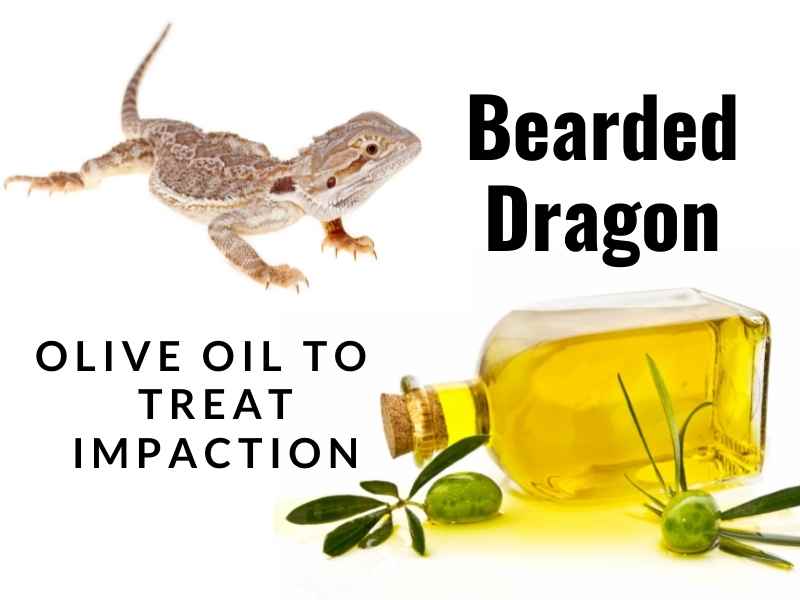
Olive oil can be used with a bearded dragon that has an impaction and is constipated. Putting a few drops of olive oil on the bearded dragon’s nose can help induce a bowel movement if it has not had one in a few days.
Repeat the technique and bathe your beardie in warm water to ease their tummy if you don’t see any benefits after a day or two.
Continue reading to learn more about bearded dragons and olive oil, including what kind of olive oil you can give your bearded dragon, why you should give your bearded dragon olive oil, whether olive oil is harmful to a bearded dragon, how to give your bearded dragon olive oil and more.
Why Give Your Bearded Dragon Olive Oil?
One of the most effective things to offer your bearded dragon to help them defecate is a few drops of olive oil.
Bearded dragons usually defecate every one to four days. However, their pooping pattern is influenced by their age, the amount of food they consume, and their overall health. Healthy bearded dragons appear to have a regular pooping routine.
As a result, if you notice that your bearded dragon has stopped pooping on schedule, sometimes it’s best to rule out a more serious lizard health condition, like impaction, by stimulating their intestines with a few drops of olive oil.
Can Olive Oil Be Harmful to Your Bearded Dragon?
They should remain unharmed if you only provide your bearded dragon with natural olive oil. However, note that this remedy only suggests giving a beardie a few drops of olive oil at a time. Much more than that can wreak havoc on their digestive system and cause them to have diarrhea or lose control of their bowels. After all, olive oil acts as a natural laxative for bearded dragons.
What Kind of Olive Oil Can You Give a Bearded Dragon?
If you plan on providing your bearded dragon with olive oil to help relieve its constipation, not only should you ensure that you are providing your lizard with a completely natural variety of oil, but also read the instructions on the back of the bottle to make sure there are no toxic ingredients in that specific brand.
How Much Olive Oil Should You Give a Bearded Dragon?
Only a few drops of olive oil are required to treat constipation or impaction in your dragon. Remember that olive oil is a laxative for bearded dragons, so the less is more principle is always best used.
Veterinary experts recommend using a dropper when giving olive oil to your bearded dragon since that allows you to control the proportions effectively.
When To Give Your Bearded Dragon Olive Oil?
If your bearded dragon hasn’t had a bowel movement in a week or longer, you should offer them a few drops of olive oil to try and stimulate a bowel movement. For example, at the very least, your beardie should defecate once a week, with two to four bowel movements each week being optimal.
If you notice that they have gone beyond this period without relieving themselves, it may be time to try a natural laxative. After all, olive oil is a natural laxative for reptiles, and it will aid in the production of more regular bowel movements and the relief of impacted or constipated lizards.
How To Give Your Bearded Dragon Olive Oil?
If your bearded dragon isn’t pooping normally and appears to be backed up, use a tiny teaspoon to measure a few drops of olive oil into a dropper. These 2-3 drops of oil should then be applied to or around the mouth and nose area of your beardie. Then they should lick it off.
Give the bearded dragon a few moments to swallow the oil before giving them additional drips. However, prepare yourself for the possibility that your bearded dragon may dislike the flavor of the olive oil.
If they are particularly averse to the olive oil and shake their heads or scrape their lips to remove it, try placing some on a piece of fruit or vegetable, preferably one of their favorite treats if you have it on hand.
This will make the olive oil more appealing to your lizard, especially if they have difficulty adapting.
Pumpkin As A Natural Laxative
Pumpkin is a good option for treating impaction in bearded dragons because it has high water content. According to the United States Department of Agriculture (USDA), pumpkin contains approximately 93.7% water by weight. [1] The high water content can help soften the impaction and make it easier for your bearded dragon to pass the blockage.
In addition to the high water content, pumpkin is also a good source of dietary fiber. Fiber is essential for maintaining healthy digestion and regular bowel movements. In bearded dragons, fiber helps to bulk up the stool and promote healthy gut motility, which can help prevent impactions.
It is important to note that while pumpkin can be helpful in some cases, it should be used in moderation. It is also important to note that canned or pumpkin puree differs from raw pumpkins. If you plan to use these products, make sure the product is 100% pumpkin and has no other added ingredients.
Prune Juice To Stimulate A Bowel Movement
Prune juice is a good laxative as it contains sorbitol, which helps to stimulate bowel movements. The sorbitol draws water into the intestines, making the stool softer and easier to pass.
We recommend diluting prune juice with water to reduce sugar concentration and prevent diarrhea. A suggested ratio is one part prune juice to three parts water. You can use a syringe to administer the mixture orally or mix it with your bearded dragon’s food. Start with a small amount, such as a few drops, and gradually increase the amount over several days if needed.
It is important to note that prune juice can be helpful in some cases as part of a comprehensive treatment plan. It is also essential not to overuse prune juice, as too much can cause diarrhea and dehydration, harming your bearded dragon. A suggested limit is no more than 1-2 drops per day for every 10 grams of body weight and only for a short time until the impaction passes.
Final Thoughts
Like humans, bearded dragons can get clogged and unable to pass a vital bowel movement. You’ve undoubtedly overheard other reptile owners mentioning using olive oil to treat constipation or impacted beardies.
Constipated bearded dragons benefit from the use of olive oil. Allow your bearded dragon to drink a few drops of olive oil on the tip of its nose if it hasn’t had a bowel movement in a few days. If you don’t observe any results after a day or two, repeat the procedure and bathe your beardie in warm water to soothe their stomach.
Stimulating their intestines with a few drops of olive oil is a fantastic way to rule out more serious lizard health concerns like impaction.
Citations
– “Pumpkin, Cooked, Boiled, Drained, without Salt.” FoodData Central, U.S. DEPARTMENT OF AGRICULTURE, 1 Apr. 2019, https://fdc.nal.usda.gov/fdc-app.html#/food-details/168449/nutrients.
